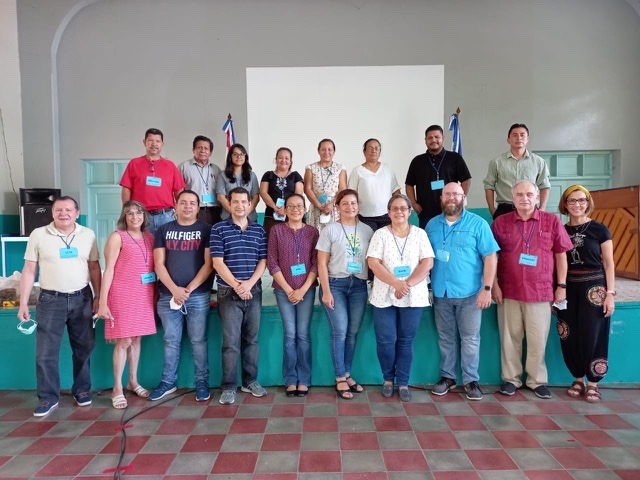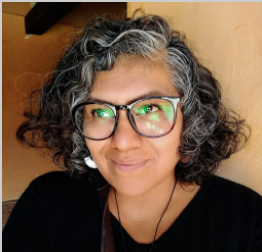
![[world map]](https://internationalministries.org/wp-content/themes/blankslate/images/IM_map_global.png)

Pictured above: Our newest cohort from El Salvador that will begin on August 30, 2021 with myself, fellow IM faculty Tim Long and Mercy Gonzalez Barnes and Palmer program director Mayra Picos Lee!
Article taken from:
Sinova Garrett, “Palmer Provides Theological Education in Latin America,” Palmer Theological Seminary, August 25, 2021, https://www.palmerseminary.edu/news/palmer-provides-theological-education-latin-america
While you may have heard of [the] Master of Theological Studies in Latino/a Ministries, what you may not know is that over one-third of Palmer Seminary’s student body is composed of students from this program. Drawing students from across Latin America from countries such as Ecuador, Mexico, Bolivia, Brazil, El Salvador, [Chile, Colombia, Haiti], and the Dominican Republic, our MTS is building an online community across Latin America that is strengthening pastors and lay leaders who otherwise wouldn’t have access to excellent theological education. In a true collaborative spirit, the MTS in Latino/a Studies merges the forces of Palmer Seminary, American Baptist International Ministries, and American Baptist Home Mission Societies.
The MTS program began in 2016 with 17 students from Mexico and by December of 2021 the program will have a total of 120 graduates with over 90% graduation rate. Dr. Mayra Picos Lee, the program director, believes that “to have a greater number of latinx students engage in theological education from their own locations and perspectives is not only critical to the growth of the church in Latin America, but to the expansion of our theological perspectives in the US and beyond.”
Illustrating the impact that the program is already having, Dalia Eunice Juárez Fernández ’20 shares her story and experience.

¿Qué te gustó de ser estudiante en Palmer?
What did you enjoy about being a student at Palmer?
Dalia: I value what Palmer started as a dream through the Rev. Dr. José Norat Rodríguez, who promoted the program in order to provide academic, biblical, and theological preparation to the leaders and pastors throughout Latin America. The educational system in almost the entire world has had to make specific decisions to give way to the world of online learning, so being a virtual student not only allowed me to connect at a distance with classmates, teachers from different latitudes to learning, unlearning, and relearning together. Additionally, online learning provided me with entering classes at the time that best suited me, as well as managing and mastering the Brightspace platform, Zoom, but the most important thing is that Palmer taught that there is no age to go back to school.
¿Por qué tomó la decisión de asistir a Palmer?
Why did you make the decision to attend Palmer?
Dalia: One of the main reasons and motivations for entering the Palmer Theological Seminary was precisely that the MTS was created and designed for a Hispanic, Latin American, and Caribbean context, in addition to the fact that such studies are the result of a collaborative effort between the Palmer Theological Seminary of Eastern University, American Baptist International Ministries (ABIM), and the American Baptist National Mission Societies (ABCHMS). In advance, I thank the heart of heaven and earth: God, for moving hearts and wills to create and launch the Master of Theological Studies in Latino/a Ministries, as it not only strengthens the pastoral and theological ministries in our different and diverse churches of Latin America, but also equips men and women to serve with love, and deep respect.
¿Cómo te ha preparado Palmer para la carrera que has elegido?
How has Palmer prepared you for your chosen career path?
Dalia: The context in which I carry out my task and pastoral work has been challenging, since I have had to look with sadness at the great needs within indigenous communities. For this reason, having been part of Palmer not only prepared me academically, it also offered me pastoral, theological, psychological, and spiritual tools to continue training indigenous Tseltal and Tsotsil leaders (men and women) in the Mexican southeast, while at the same time it has given me the enormous opportunity to continue strengthening hope, as well as to help indigenous churches to better understand and interpret the biblical context – not to err with fundamentalism that all they achieve is division, at the same time to strengthen a gospel, theology and pastoral embodied, grounded and contextualized among the indigenous Mayan peoples.
¿Cual es tu historia? (Sea conciso y comparta cualquier parte de su viaje que le gustaría destacar).
What is your story? (Be concise and share any part of your journey you would like to highlight).
Dalia: I cannot help but thank God, because despite all the (economic) obstacles that I encountered on the path of mastery, I can say like Samuel: “Eben-ezer” up to here Jehovah helped me. Being a Nahuatl indigenous woman of which I am proud, it is not easy to find economic resources to study, to look at the context of indigenous women in Mexico, of poverty, domination, exclusion, and violence. I consider, like Tomás Bulat, that: “When you are born poor, studying is the greatest act of rebellion against the system. Knowledge breaks the chains of slavery ”.
I have completed the Master of Theological Studies in Latino/a Ministries, and I can say that I found in my teachers, virtual classes, and readings, the earnings that I am sharing with my indigenous Mayan brothers and sisters, who inspired me to challenge my preconceived perceptions about theology, church, spirituality, pastoring, and even about learning.
I have no doubt that what I learned, unlearned, and re-learned from my time at Palmer is helping me to create new spaces where children, women, men, and the elderly are transforming their reality.